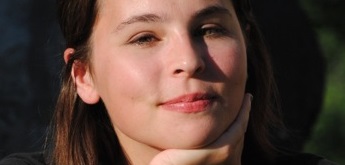Follow Olivia Polk as she blogs her way through her final year of undergraduate studies. She is a fourth-year English literature student, pursuing a B.A. Hons.

September 8, 2014:
How I Learned to Stop Worrying and Embrace the Unknown
Stepping foot on the Carleton campus for my last “first time” of the year, I’m struck by how subtly (and yet, somehow, how drastically) my outlook has shifted since my first “first time”, back in September of 2010.
For one thing, I have ceased regarding campus as just another place of business, and have instead come to regard it as an extension of my home (convenient, since I spend more time on campus than I do at my actual home). For another, after three-or-so years of looking upon my professors as paragons of intellectual virtue (which, of course, they are), I’ve found myself increasingly drawn towards them as mentors and as free exchangers of ideas, rather than pushed away by a sense of my own inferiority.
However, I think the single greatest perceptual shift that has occurred is how I’ve come to view the process of learning itself.
Though it seems somewhat embarrassing to admit, I believe I was more confident in my knowledge at the beginning of first year. But I believe the knowledge that I have acquired now, however modest in the grand design of academia, is more genuine, and has been acquired more purposefully, more intentionally. I came in thinking that I had the world figured out (as only a naïve, Plath-loving teenager would), and, as I sit here waiting for my first fourth-year seminar on post-colonial theory to begin, I feel invigorated by an awareness of all the things I have yet to learn, and all the perspectives I have yet to gain.
There is a stubborn fear that accompanies this realization, of course: a fear that I might never “figure it out,” with “it” being, in fact, the countless tiny threads that seem to hold us together, but threaten to snap under the pressure of too close an analysis. As literature majors (indeed, as university students, and as human beings), we are united in a quest for meaning; as citizens of what one might (rightly or wrongly) argue is a “post-modernist” world, we are reminded at every turn of the constructedness, the provisionality, of meaning. It is something we make and turn out in language; it does not simply exist.
The other day, I was talking with a friend, and we got onto the topic of the general misery that seems to haunt great writers like a shadow (in this case, high modernist writers like T.S. Eliot and Virginia Woolf). And he said something that stuck with me: “Maybe the reason the great writers were depressed is because they were really just trying to capture the magnitude of what they really felt. . . that metaphor just out of reach.”
It’s certainly not a new sentiment, and it knowingly circumvents the complex socio-historical context of the modernist moment, but it’s a captivating one. And it made me wonder (again, not originally) if it isn’t exactly because all they have is metaphor that some of our great writers become depressed. The best thing they can do is describe what something is like, rather than what it really is. Moreover, I wonder if it is why we, in spite of our status as burgeoning critics, can come to feel bogged down the more we read. Just as soon as we feel that, yes, we know now, yes, we understand how, we come across a theory, a poem, a fragment that throws our carefully constructed sense of “it” into question.
Yet, the great writers continue to write, most of them right up until their deaths, and we continue to read their works and write papers on them. What is that if it isn’t an exercise in futility? I mean, really. Common sense would suggest that we wave a white flag and take up something more pragmatic, like engineering or business: something where there are formulae (and, well, jobs).
But true education, I’ve learned, is not so much meant to give us the “right” answers as it is meant to equip us with the tools we need to ask the right questions: how to think, rather than what to think, as Margaret Mead once put it. And, as we spend the next year grappling with the nature of “truth” alongside some of our most culturally beloved characters (as well as many we have not previously been exposed to), the challenge I lay at our feet is that we might embrace and engage the discomfort that literature so often inspires, and discover that, in fact, there is no place we’d rather be.
Make yourselves at home, fellow students. Just don’t get too comfortable.
Addendum: If you want to read a great article on knowledge, as it relates to others and ourselves, you should check out Joshua Rothman’s piece “Virginia Woolf’s Idea of Privacy,” which was published in The New Yorker in July.
In fact, you know what? Do yourself one better and just read Virginia Woolf. If you haven’t sipped her particular brand of Kool-Aid yet, trust me: you will feel as if you’ve gained a sixth sense.
